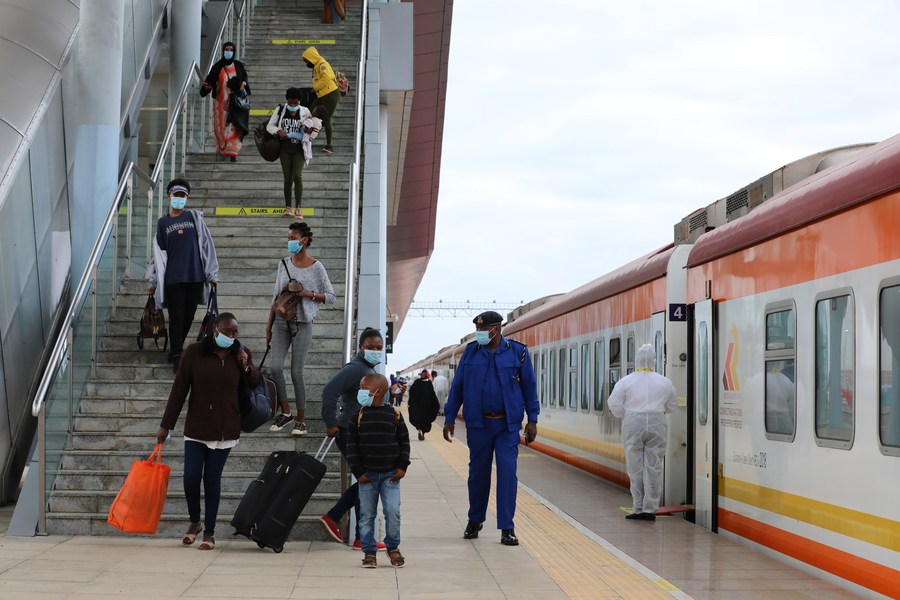Program cushions over 250,000 Kenyan youths against COVID-19 impacts


Over 250,000 Kenyan youths in informal settlements have been able to earn a living amid the tough economic times occasioned by the coronavirus pandemic, thanks to the national hygiene program commonly known as Kazi Mtaani, loosely translated as, "Jobs in our Hoods".
The program has seen youth earn $4 per day, enabling them to meet their basic needs, as well as ensuring they adhere to coronavirus containment measures.
So far, $92 million has been invested in the program, according to the World Bank, the program's key financier.
"Kazi Mtaani has been a game changer for so many families across the country, particularly at a time when the economy has contracted due to the ongoing coronavirus pandemic," Charles Hinga, principal secretary in the State Department for Housing and Urban Development, said in a statement on Monday.
In the first phase of the program, which ran from April 29 to June, more than 26,000 jobs were created under the Kenya Informal Settlements Improvement Project, at a cost of about $3 million.
The jobs were created in 27 settlements across eight counties most severely constrained by the restricted movements at the time, namely Nairobi, Mombasa, Kiambu, Nakuru, Kisumu, Kilifi, Kwale and Mandera.?
Under phase 1, youth earned a daily wage of $6 paid through mobile money transfer, but the amount was reduced to $4 following a request by the community to have more youths enrolled into the program.
The youths engaged in labor-intensive work, such as street and drainage cleaning, garbage collection, bush clearance, and fumigation and disinfection, while ensuring a clean environment and improved urban infrastructure and service delivery.?
Janet Yalla, a resident of the Kibera slums, said the program not only improved livelihoods but also reduced crime and drug abuse.
"Initially, many young people were idling in the streets, mostly in groups where they could strategize on criminal activities. Some would sit in groups chewing khat throughout the night or abusing other drugs, while others were drinking too much alcohol, causing conflicts in their houses," Yalla said.
Jacob Owuor, a beneficially of the program who lost his job following the outbreak of the coronavirus pandemic, said he has been able to meet basic needs for his family.
"I'm truly grateful to the government for launching the program. Many of my friends who were engaging in crimes due to joblessness have now become responsible. I hope the government will continue creating such opportunities," he said.
In addition to offering a source of income to vulnerable youths, most of whom lost their jobs, the program has ensured a clean environment in the informal settlements, Owuor said.
Mary Mwende, a former hawker and a single mother of two, said the program has enabled her to feed her family.
"When coronavirus compelled me to stop hawking second-hand clothes in Nairobi's central business district, I was frustrated and didn't know how to fend for my family going forward. Luckily, the government rolled out Kazi Mtaani and I was enrolled. I'm grateful to the government because we have had a meal on the table daily," Mwende said.
The phase 2 program, expected to run for six months, is covering all 47 counties and will focus on sustainable work activities, such as construction of public spaces. Also included is infrastructure, such as schools, libraries, toilets, footpaths, painting and cobblestone road paving.
A hybrid of skilled and unskilled labor has been engaged in a bid to ensure that the program delivers value post coronavirus.
"We expect that?many more lives will be impacted positively in the next six months and beyond. We are already training the workers in road construction and house building, using interlocking stabilized soil blocks technology to take up new opportunities under community contracting to ensure the sustainability of the program beyond the six months," Hinga said.
The phase 2 program will be financed by the government and has recruited an additional 283,210 workers across the country.






























